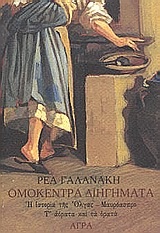I have arrived at a lot of conclusions. The most important one, with all the risk of my personal opinion, is that, especially today, arts and active political activity cannot walk the same path. They have different directions, require a different mind-set; the ethic of each is different as well. The crisis has polarized their differences, precisely because it is not just economic. No crisis has ever been just one or the other, whereas all crises have been used as a pretext for institutional violence of any kind.
In any case, the lack of funds has brought the arts down on their knees, especially with regard to the making, distribution and marketing of books, but also as concerns all cultural products dependent on government subsidies. Writers are stunned but have never stopped writing, good books are still being published, albeit less, but they are rarely following the path they followed until recently. However, there are other phenomena. For example, theatre and music are flourishing in the Athens of the crisis, as small groups are finding alternative spaces where they are performing, thus receiving an immediate revenue, without a chain of intermediaries, as is the case with books, for example. Festivals survive on tight budgets but with a worthy programme. Ticket prices are low, there are numerous discounts, and the people support arts as they can. In other words, the lack of money may have brought some aspects of arts down on their knees, but it has not destroyed them because no crisis has ever destroyed the arts.
Since no crisis has ever destroyed arts, I repeat this. This is why the arts are resisting today, especially artists, precisely because they are supplying themselves with new subjects, I would say, they are "suckling" from the other aspects of the crisis, namely its immoral side, the intolerable lawlessness, the state authoritarianism, the mechanisms of corruption, the human degradation, anger, poverty, hunger, suicide; from the incompetence of the government to stop this deadly move, perhaps because they are not directly affected - just like many others, who are defiantly visible among us, are not affected either. Arts, as I understand them, cannot lean on anything but human drama, whatever the mask of time or faces it uses, whatever form it takes or whatever theory it relies on. A lot of tragedies are happening around us, "a street novel is being written every day," as I say elsewhere.
- Your poems are included in the anthology "Daughters of Sappho: Contemporary Greek women poets," ([Tr.by]: Rae Dalven · Editor Rae Dalven. Rutherford: Fairleigh Dickinson University Press, 1994), among works of Greek women poets like M. Poliduri, Zoe Kareli, Rita Boumi - Pappa, Eleni Vakalo, Victoria Theodorou, Lydia Stephanou, Kiki Dimoula, Nana Isaiah, Zefi Daraki, Katerina Anghelaki Rooke, Pavlina Pampoudi, Jenny Mastoraki, Veroniki Dalakoura etc. How did the Anglo-Saxon readership respond to this edition?
 - I have no idea of the fate of the anthology. However, I am surprised that you are asking me about it when my other novels have been translated into fifteen languages. I have no clear idea of them either although I have a direct interest in them. At first, I was informed but not about all translations, since when things have faded away, especially in recent years, when the Greeks have been perceived as second-class citizens and no one "wants to play with us," and the crisis has affected many countries. The translation of foreign authors into Greek has somewhat declined as well. As far as I know, the works of no contemporary Greek author other than the good crime novels by Petros Markaris have a lasting and active presence abroad.
- I have no idea of the fate of the anthology. However, I am surprised that you are asking me about it when my other novels have been translated into fifteen languages. I have no clear idea of them either although I have a direct interest in them. At first, I was informed but not about all translations, since when things have faded away, especially in recent years, when the Greeks have been perceived as second-class citizens and no one "wants to play with us," and the crisis has affected many countries. The translation of foreign authors into Greek has somewhat declined as well. As far as I know, the works of no contemporary Greek author other than the good crime novels by Petros Markaris have a lasting and active presence abroad.
I would, however, like to add the following: this does not matter. We write in Greek, we write about what we experience, but also about what rules our imaginations, our literature accurately measures our relative weight. The rest is either coming or not. So it does not matter.
In 2011 the Benaki Museum, at 138 Pireos Street, presented a major exhibition of marine artist Jean Altamouras (Italy, 1852 – Spetses, 1878), the son of the first Greek female painter of the 19th century, Eleni Boukoura – Altamouras, who broke many of the stereotypes and conventions of her time. In parallel with this exhibition, the National Film Archive screened a documentary (directed by Kleoni Flessa) on the life of Eleni Altamouras. She is the daughter of Ioannis Boukouras, a hero of the Greek Liberation Revolution of 1821, a ship-owner from the Island of Spetses, who had provided part of his wealth for the national struggle. Eleni studied painting in Rome and Florence while living in Italy with her husband, Italian painter Saverio Altamouras, and took part in the revolutionary uprising for the unification of Italy. Is this cinema biography shedding enough light on the creative, poetic and revolutionary way in which this woman and pioneer artist lived her life? What is the aspect from which you have recreated Eleni Altamouras’ life in your novel "Eleni, or Nobody?" Is this title a reference to the answer given by Odysseus to the Cyclops when he asks, "Who are you?" and the clever hero of Ithaca replies "Nobody" ("Ούτις")?
 - My novel preceded the film. They differ as you have found out and this is natural. The difference can be seen from the title which actually refers to "Ούτις", to "Nobody", Odysseus’ reply to the Cyclops. That is, differences can be established at the multiple levels which that novel contains.
- My novel preceded the film. They differ as you have found out and this is natural. The difference can be seen from the title which actually refers to "Ούτις", to "Nobody", Odysseus’ reply to the Cyclops. That is, differences can be established at the multiple levels which that novel contains.